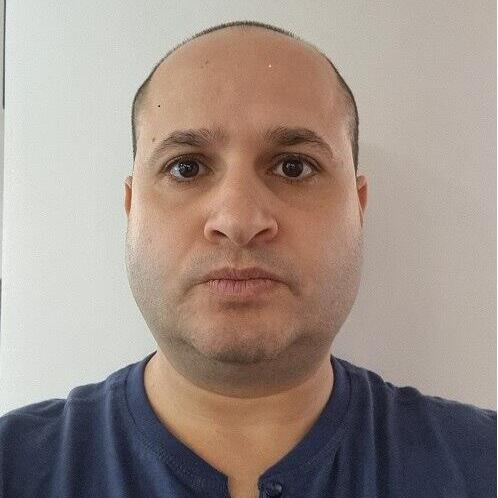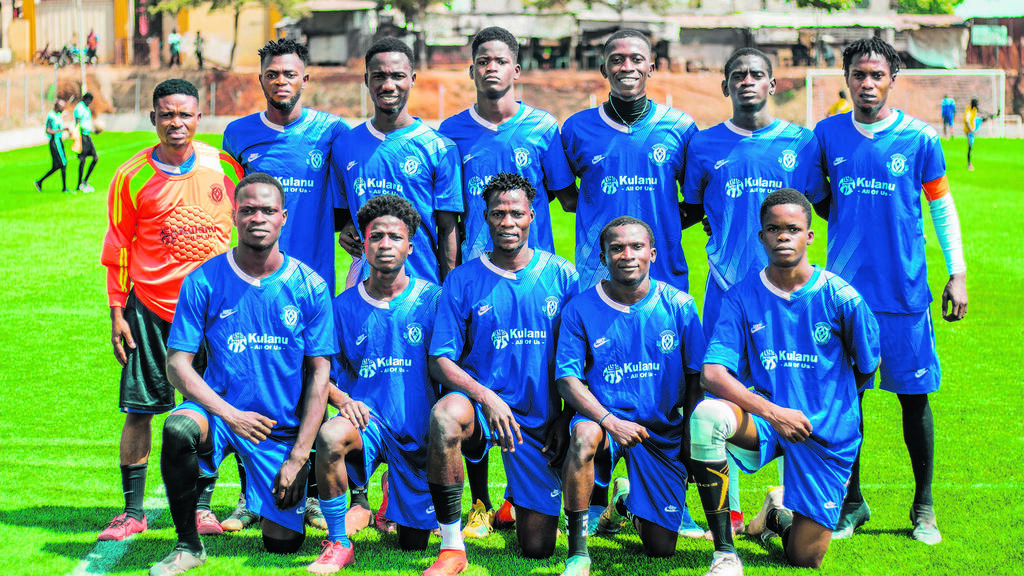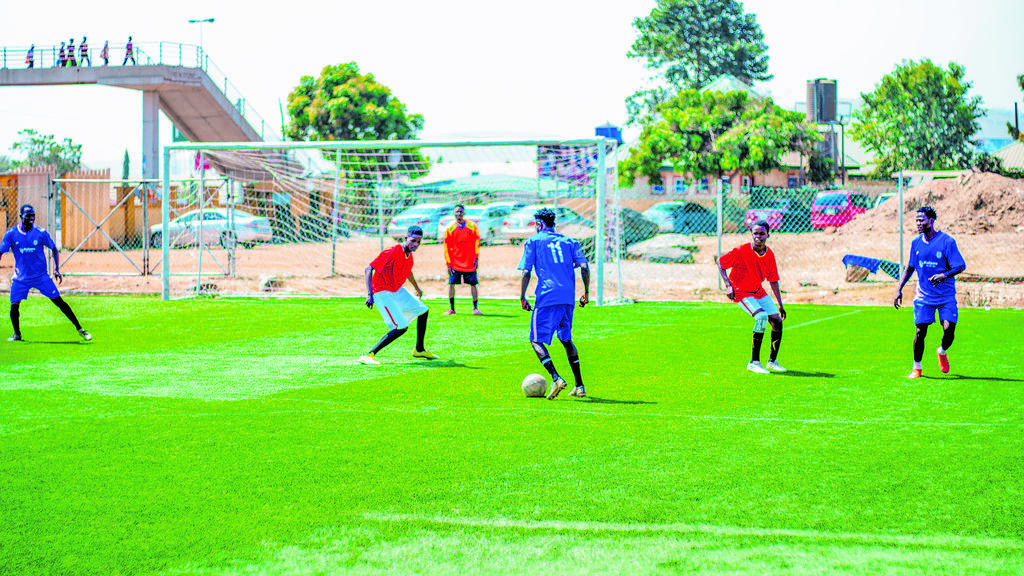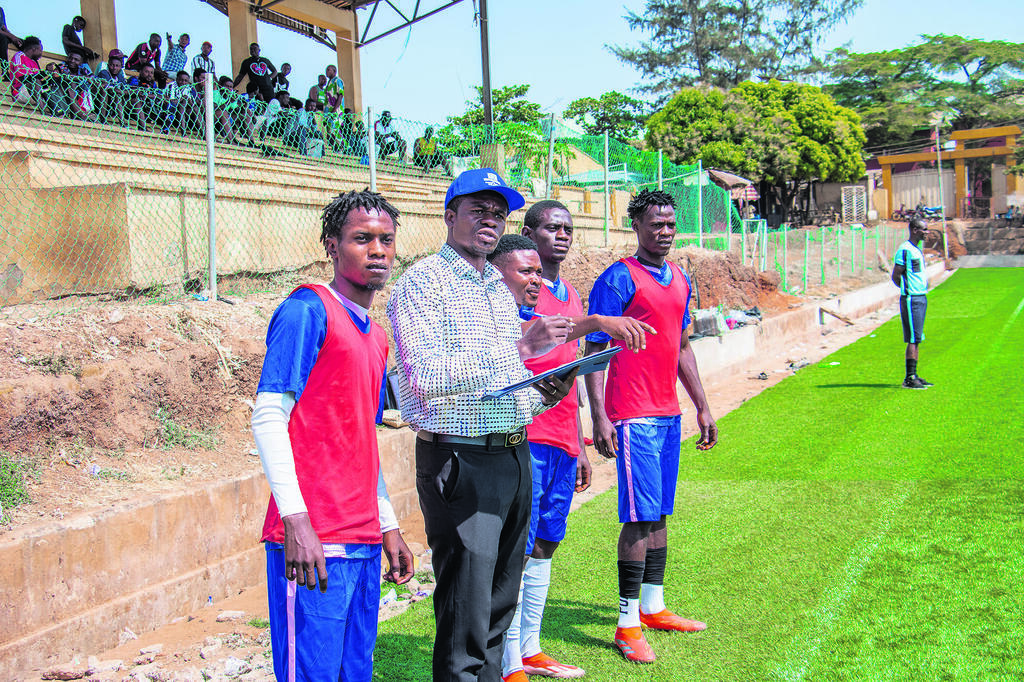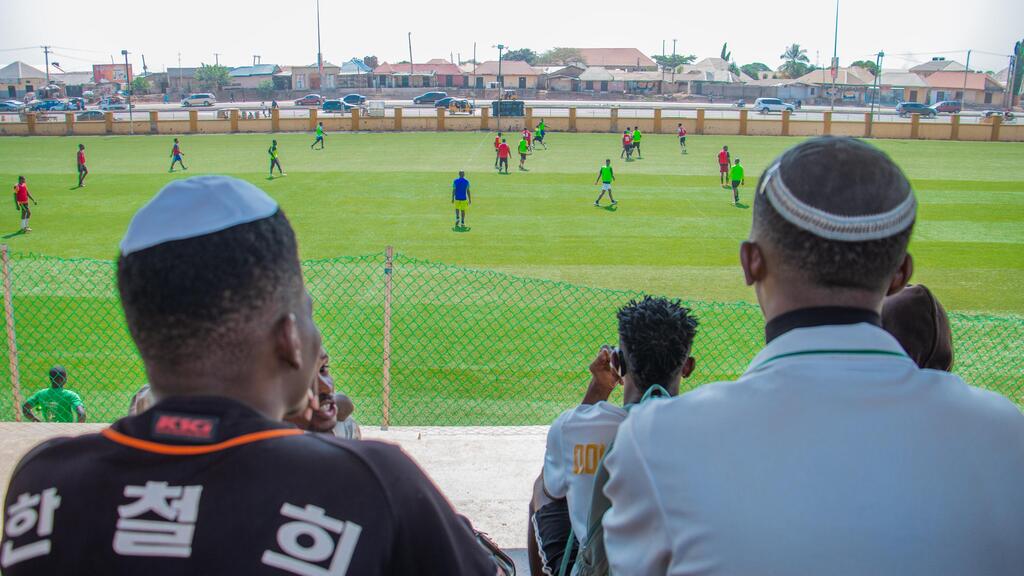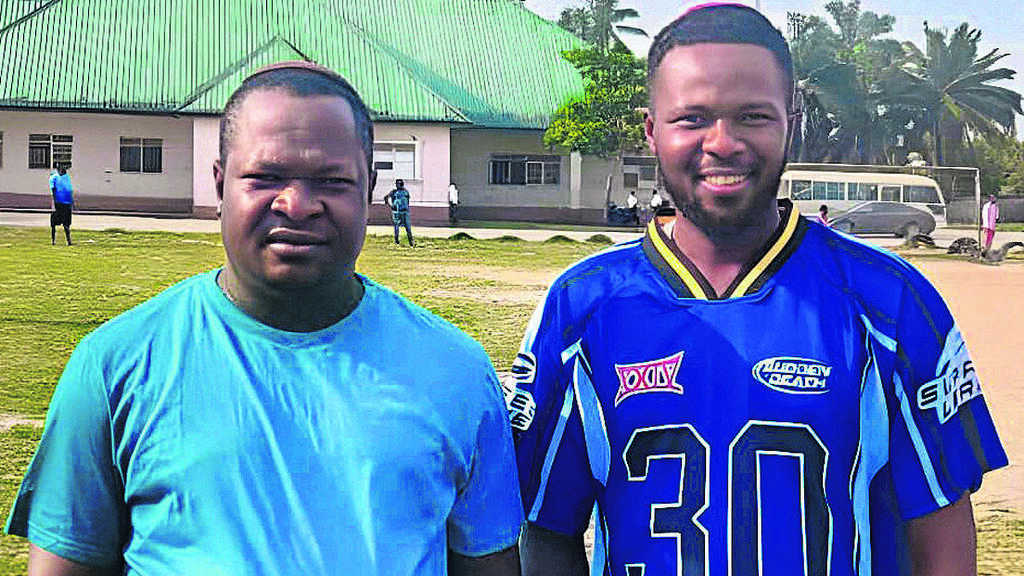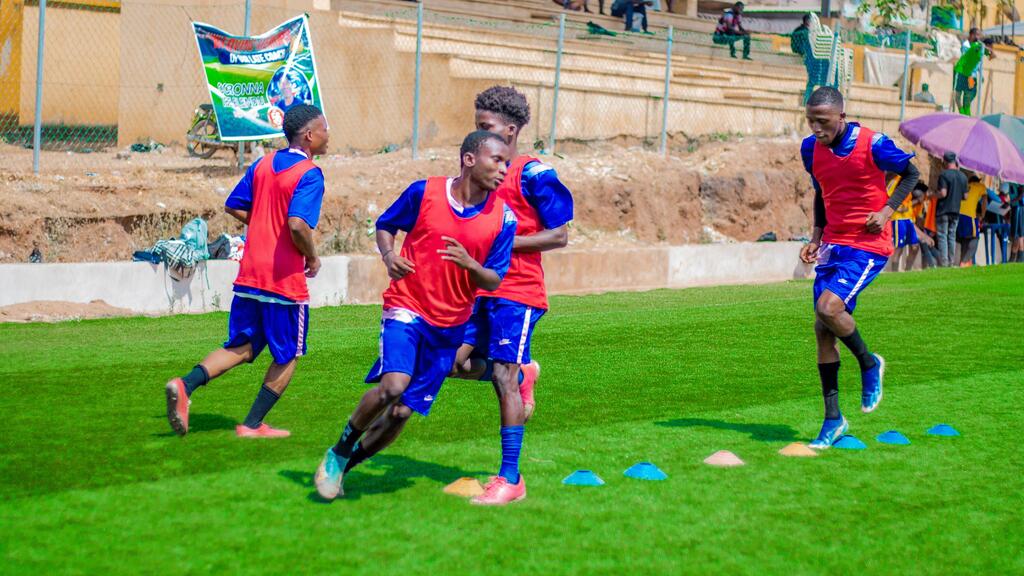Members of Nigeria’s Igbo Jewish community, which claims to be descendants of a biblical Hebrew clan, have set their sights on a historic goal: to register a team for the 2025 Maccabiah Games in Israel.
If successful, they’d become the first sub-Saharan African team to participate, composed of players from synagogue teams scattered across Nigeria’s small Jewish communities. The challenge is immense –financially and religiously.
This is one of the more mysterious corners of Judaism. Many don’t even recognize it as a Jewish community. While the exact number is unclear, tens of thousands of Igbos — or possibly more — living in Nigeria’s Biafra region identify as Jews.
They claim direct descent from the Tribe of Gad and have adhered to practices connected to the Jewish calendar for millennia, including observing holidays, circumcision, wearing kippahs, reading from the Torah and fasting.
Due to the scarcity of kosher food in Nigeria and the absence of a chief rabbi to oversee the communities, many operate independently, growing their food to ensure dietary laws are observed.
Their lives aren’t easy – they are persecuted and ostracized by Musims and Christians, including the Christian Ibo people who do not accept them, and their leader, Nnamdi Kanu, is imprisoned in Nigeria and his life is in danger.
Meanwhile, Israel’s Chief Rabbinate does not vconsider them to be Jews at all. The Maccabiah is happy to host Jews from all diasporas and sects, but the guiding principle is that participation is permitted under the Law of Return - and this is the root of the problem, since the Rabbinate has not approved thier Jewishness.
The Igbos aren’t looking to immigrate to Israel; they simply want their Judaism acknowledged. Without recognition, they can’t compete in what they call "Israel’s Olympics."
Slow but steady progress
The idea to compete began with communal Shabbat gatherings over recent years to strengthen internal unity. Synagogues took turns hosting Igbo Jewish youths who came from near and far to study Torah together, engage in Jewish discussions, and organize soccer tournaments on Sundays.
Gradually, these matches began drawing crowds. Older players joined in and synagogue teams started competing more regularly, not waiting for special occasions. Some participants surprised onlookers with impressive skills.
"Establishing the club was a creative initiative to connect and develop talented young players," Igbo Maccabi Soccer Club spokesman Avraham Ben Avraham shared. "Our vision is to compete in the 2025 Maccabiah and future events. Most players are aged 18–26; 80% are Igbo, and the rest belong to other tribes with Jewish traditions. Our main challenge now is initiating the registration process for the Maccabiah.
"We face logistical and financial hurdles in sending a team to an international tournament. We’re still figuring out what’s required, but as first-time participants, sending an email to Maccabi World Union won’t suffice. We’re working with a liaison in Israel."
The driving force behind the project is Shlomo Ben Yaakov, a cantor at Gihon Hebrew Synagogue in Abuja. He dreams of becoming Nigeria’s chief rabbi after completing the necessary training. At the same time, he’s a keen coach who assembled the team aiming for the Maccabiah.
Speaking to the BBC, Ben Yaakov said: “For those of us who know our roots, we are confident of our identity. If the Christians and Muslims can accept their own and support them, then I think the Jews should also show some encouragement."
He expressed frustration at the requirement to undergo conversion for recognition by the Chief Rabbinate, insisting that “As converts we would be seen as second-class citizens.”
Ben Yaakov, having years of soccer experience, shaped Maccabi’s playing philosophy: honing technical skills, fostering teamwork and promoting personal growth. The long-term goal is a sustainable model for developing young Jewish athletes in Nigeria to reach professional levels — but the Maccabiah remains the immediate dream.
“Part of our preparatory steps for the Maccabiah involves a comprehensive training program in the sports facility in Abuja," Ben-Avraham elaborated. "The team is training weekly and playing friendly matches to mentally prepare for the Maccabiah Games. The management intends to open camp four months ahead of the 2025 Maccabiah, embarking on maximum training to enhance the players' performance even as underdogs in the tournament.”
“If we eventually get into the competition, we'll not just be representing ourselves but Nigerian and other Sub-Saharan African Jews as a whole, so we're determined to do our best in the Israeli Olympics even as underdogs."
A soccer match is planned for Hanukkah against a team of Israelis from a Chabad House in Nigeria’s capital, marking the first time they’ll face non-Igbo Jewish opponents.
Kadmiel Imanuel, 25, a member of Gihon Hebrew Synagogue in Abuja, is focused on a clear goal. "Our goal is to be the first Jewish team from West Africa to participate in the Maccabiah Games. Ever since we heard about the competition, we've been working tirelessly to make sure we are fit and ready to compete if called to represent," he said.
“We've trained together and played a few matches against strong opponents, but each time we put up an impressive performance, worked as a team, and proved to ourselves that we are ready to compete at the top level. We understand the challenges ahead, as we aim to accomplish unprecedented feats, but we are steadfastly progressing, persevering and putting in significant effort both on and off the field to ensure our success.”
Do you see this as a personal mission?
“If we eventually get into the competition, we'll not just be representing ourselves but Nigerian and other Sub-Saharan African Jews as a whole, so we're determined to do our best in the Israeli Olympics even as underdogs."
Another hopeful is Yerubabel Gideon, 23, from Beit Chessad Synagogue in Aba. For him, being part of a Jewish sports club is significant. "I would like to express my heartfelt gratitude and joy for being a part of Maccabi Football Club Nigeria, a Jewish Nigerian team that aspires to participate in the Maccabiah in Israel. For a couple of years, we have been involved in Jewish football on the grassroots level, but it was a bit unorganized with no external management compared to what we have right now- a formidable and standard youth professional footballers,” he said.
“What we're trying to do is something many think is impossible. But as a team, we believe we can. People here have collaborated with Jews worldwide in different areas of activities. Therefore, we believe we can as well collaborate with the rest of the world Jewry in the area of sports through the Maccabiah Games," Gideon added.
Supporting the effort are the Initiative for Progressive Judaism Development (IPJD) and the Avraham Ben-Avraham Foundation, both nonprofit organizations within the local Jewish community promoting soccer among Nigerian Jews.
Suffering for their faith
Internationally, the club receives backing from Kulanu, a nonprofit aiding remote Jewish communities in Africa, Asia, and Latin America and seeks further support from organizations in the U.S. and UK. This support is crucial as participating in the Maccabiah is expensive, costing thousands of dollars per player, a sum out of reach for most community members.
Shaul Meiselis, chair of the Igbo Friends of Israel association, has long campaigned for their Jewish recognition. He recently approached newly appointed Sephardic Chief Rabbi David Yosef urging a reassessment of their status.
Get the Ynetnews app on your smartphone: Google Play: https://bit.ly/4eJ37pE | Apple App Store: https://bit.ly/3ZL7iNv
"I hope a door will open," Meiselis said. "I reminded him that his father, Ovadia Yosef, spearheaded recognition for Indian and Ethiopian Jews and he could follow suit. The Igbo people have been given the image that they are not Jews because of their conversion to Christianity in the distant past, but these are poeple who suffer for their Judaism, who are literally being abused by the Nigerian army and by the people of Boko haram, the "extremist Muslims."
What’s your impression of their connection to Judaism?
"They show extraordinary dedication and devotion, building synagogues and observing Jewish customs. Diaspora Jews have always existed and just as Ethiopian Jews eventually gained recognition, the Igbo have clear indications of Jewish heritage."


